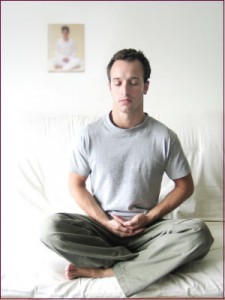People who meditate regularly find pain less unpleasant because their brains anticipate the pain less, a new study has found.
 Scientists from The University of Manchester recruited individuals into the study who had a diverse range of experience with meditation, spanning anything from months to decades. It was only the more advanced meditators whose anticipation and experience of pain differed from non-meditators.
Scientists from The University of Manchester recruited individuals into the study who had a diverse range of experience with meditation, spanning anything from months to decades. It was only the more advanced meditators whose anticipation and experience of pain differed from non-meditators.
The type of meditation practised also varied across individuals, but all included ‘mindfulness meditation’ practices, such as those that form the basis of Mindfulness-Based Cognitive Therapy (MBCT), recommended for recurrent depression by the National Institute for Health and Clinical Excellence (NICE) in 2004. [continue reading…]
Published: March 15, 2010
 Meditation has analgesic benefits associated with creating a relaxed state of mind and enhancing the ability to moderate reactions to pain, according to new research published in The Journal of Pain, the peer review publication of the American Pain Society. [continue reading…]
Meditation has analgesic benefits associated with creating a relaxed state of mind and enhancing the ability to moderate reactions to pain, according to new research published in The Journal of Pain, the peer review publication of the American Pain Society. [continue reading…]
New Research Reveals That Swearing Can Actually Increase Pain Tolerance

Researchers from Keele University’s School of Psychology have determined that swearing can have a ‘pain-lessening effect’, according to new study published in the journal NeuroReport.
While swearing is often a common response to pain, Dr Richard Stephens and his colleagues, John Atkins and Andrew Kingston, were surprised to discover that no links had been established between swearing and the actual experience of physical pain. Since swearing often has a ‘catastrophising’ or exaggerating effect, serving to embellish or overstate the severity of pain, Stephens and his team hypothesised that swearing would actually decrease the individual’s tolerance of pain. [continue reading…]
Published: January 9, 2009
 It’s debilitating, isolating and can lead to severe depression – yet pain is widely accepted as something to be expected and regarded as ‘normal’ in later life. Now a new study from The University of Nottingham examines older people’s experiences of pain and how best Government, the NHS and social care agencies can address the issue.
It’s debilitating, isolating and can lead to severe depression – yet pain is widely accepted as something to be expected and regarded as ‘normal’ in later life. Now a new study from The University of Nottingham examines older people’s experiences of pain and how best Government, the NHS and social care agencies can address the issue.
The report, Pain in older people: reflections and experiences from an older person’s perspective, aims to highlight the issue of pain in older people by exploring their experiences of living and coping with persistent pain. Funded by Help the Aged and the British Pain Society, the study saw researchers interview older people about their experiences of pain and how it affected their lives, both physically and psychologically. Literature on pain in older people was also reviewed.
The report – which reveals that nearly five million people over the age of 65 are in some degree of pain and discomfort in the UK – has already led to questions being asked of the Government in the House of Lords.
[continue reading…]
 Scientists from The University of Manchester recruited individuals into the study who had a diverse range of experience with meditation, spanning anything from months to decades. It was only the more advanced meditators whose anticipation and experience of pain differed from non-meditators.
Scientists from The University of Manchester recruited individuals into the study who had a diverse range of experience with meditation, spanning anything from months to decades. It was only the more advanced meditators whose anticipation and experience of pain differed from non-meditators.


